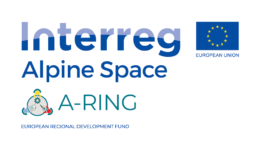A-RING – Alpine Research and Innovation Capacity Governance
Although most of EUSALP regions developed Smart Specialisation Strategies S3/RIS based on EC requirements, there is still a little focus on a transnational approach of the triple helix for the strategic Alpine Region’s topics, such as Digital Divide, Climate Change, Biodiversity conservation, etc.
The fact that policy makers, Academia and Business Sector are not always jointly valorising elements of S3/RIS, leads them to run at different pace holding back benefits for the entire Alpine Region.
A-RING
A-RING addresses the overall need to pool efforts in tackling major challenges with joint Research and Innovation (R&I) approach steering EU Open Innovation path. It fosters alignment between different R&I policy initiatives and institutional frameworks to effectively address societal challenges, increases the uptake of strengths and assets, and gathers expectations from Business Sector and innovation potential from Academia, granting citizens’ needs linked to responsible R&I (RRI).
A-RING Partners work on setting up the basis for an effective and permanent transnational cooperation for shared R&I policies in the Alpine Region, through:
- Development of a unique path for shared R&I Agenda to ensure strong focus on Alpine Region characteristics and potentials, on shared ownership and R&I strategic positioning for S3 areas that most affect societal changes;
- Set up of Alpine policy lab to develop and test Public Authorities’ synergic and complementary approach on selected R&I topics ensuring coordinated fast track of regulations with overall benefits for AR community;
- Activation of Alpine Seed Lab to strengthen joint work of Academia and Business Sector representatives, especially SMEs, on topics of strategic importance for Alpine Region.
A-RING aims to increase the level of application of multilevel and transnational governance in the Alpine Space with the right policy mix achieved in coherence with the Public Authorities’ vision, their synergic and/or complementary approach on S3 strategies and improved environment for the collaboration including Academia and Business Sector.
In order to achieve the above-mentioned results, partners will deliver:
- A Blueprint for shared R&I Agenda (SRIA) that defines common priorities, objectives, operational, political and R&I actions, involving triple helix in order to have Blueprint broadly accepted by Universities, Research Centres, Public Authorities, Innovation Hubs, Business Sector (SMEs) and other R&I actors;
- An Alpine policy lab with its Policy Briefs that provides indications on approach Public Authorities should implement to jointly face AR societal challenges; recommendations on political and financial actions in support of Alpine cooperation between Academia & SMEs; and on integration of R&I results in Alpine policies and strategies;
- An Alpine Seed Lab with its Alpine R&I Chart that supports the Alpine Innovation Network between Academia and Business Sector, especially SMEs, on topics of AR relevance to take advantage of private investments and public funds in innovation and industrialisation of research results and to further develop AR potentials, assets and capabilities.

A-RING project partners will actively involve different actors and stakeholders in the Alpine Region, in detail:
- Regional and national Public Authorities involved in S3/RIS policies elaboration and implementation;
- Local authorities, municipalities, local administrative bodies and districts;
- Local and regional development, employment and business development agencies;
- Utility companies and public transport providers;
- Associations of researchers and research societies;
- Universities and research centres with excellences in R&I topics of specific importance for AR Area;
- Training, learning and vocational facilities linked to SMEs;
- Enterprises, including global players that promote innovative solutions in topics of specific importance for AR area;
- Small medium enterprises that promote innovative solutions in topics of specific importance for AR area;
- Business Support Organisations (BSOs), such as chamber of industry and commerce, chamber of trade and crafts and business incubators, trade unions, involved in promoting innovative processes in business community;
- International organizations advocating for an integrated approach on R&I topics for mountain areas;
- Important target group for R&I policies in AR area such as: EUSALP AG1 members, EC-JCR, Alpine Convention;
- AR citizens with interest in AR strategic topics.
A-RING Project observers:
- Salzburg University of Applied Sciences, AT;
- University of Applied Sciences and Arts Western Switzerland – School of Engineering and Architecture of Fribourg; CH;
- Ministry of Education, Universities and Research, IT;
- Steinbeis Technology Transfer Ltd., Steinbeis Transfer Center – Steinbeis Danube Center, AT;
- METREX Network for European Metropolitan Regions and Areas, FR;
- Innovation and Technology Transfer Salzburg GmbH, AT;
- International Lake Constance University, CH;
- Bavarian Ministry of Economic Affairs, Regional Development and Energy, DE;
- Departement of industry, crafts and energy of the Aosta Valley Region, IT;
- University of Applied Sciences HTW Chur, CH;
- Health Network BioLAGO e.V., DE;
- Office for Higher Education of the canton of Grisons, CH;
- Labex Innovation and Mountain Territories – University of Grenoble Alps, FR;
- Pulp and Paper Institute Ljubljana, SI;
- Network for European Mountain Research, ES;
- EUROMONTANA, FR;
- Service to Regions and Communes, CH;
- Mountain Research Initiative (MRI), CH;
- Austrian Federal Ministry of Education, Science and Research (BMBWF), AT;
- Laboratory of historical research Rhône-Alpes-UMR 5190, Lyon (University of Lyon 2 Lumière), FR;
- SPAN Ltd., Ljubljana, SI;
- Aalto University Foundation, FI;
- Government of the Federal State of Vorarlberg Department Science and Education, AT;
- Wirtschafts-Standort Vorarlberg GmbH (WISTO), AT;
- Auvergne-Rhône-Alpes Regional council, FR;
- Region Friuli Venezia Giulia, IT;
- CAMPUS 02 University of Applied Sciences, AT;
- International Scientific Committee on Research in the Alps, ISCAR, CH;
Start Year2019
End Year2022
PartnershipFunding BodyInterreg Alpine Space
LeaderUniversity of Milan - CrC Ge.S.Di.Mont.
TeamAnna Giorgi, Giuseppe De Luca
